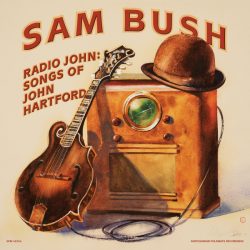A tribute album to the Bluegrass renaissance man.
 This is something of a special event – a new album from the great Sam Bush, one of the premier mandolin players of his generation and a guiding light of the progressive bluegrass scene. It has been some eight years since his last recording and an album is long overdue. This new recording is all the more special since it’s a tribute to his friend and mentor, John Hartford.
This is something of a special event – a new album from the great Sam Bush, one of the premier mandolin players of his generation and a guiding light of the progressive bluegrass scene. It has been some eight years since his last recording and an album is long overdue. This new recording is all the more special since it’s a tribute to his friend and mentor, John Hartford.
Hartford, probably best known outside bluegrass circles for his songwriting, most notably ‘Gentle On My Mind’, was a major influence on Bush’s musical direction after Sam first saw him on The Wilburn Brothers Show back in 1967, and Bush and Hartford would become good friends and frequently jam together over the years, right up until Hartford’s untimely death in 2001, so this is an album long in the planning. Hartford wasn’t just an outstanding musician and a great songwriter, he was also a licensed riverboat captain, a wandering troubadour, a pioneer of progressive bluegrass, an indie record label owner; it’s no coincidence that he’s highly regarded in the music business and, especially so, by Sam Bush, something of a renaissance man himself and someone who has taken a lot of his cues, over the years, from the example that Hartford set.
All the tracks on this album, with the exception of the title track, ‘Radio John’, were written by Hartford and this is a good snapshot of what an excellent writer he was, from love songs like ‘A Simple Thing as Love’ through to comedy offerings like ‘Granny Wontcha Smoke Some Marijuana’. Hartford was one of the main writers featured on the “O Brother Where Art Thou?” soundtrack, that did so much to promote americana music to a wider audience. He is one of the great unsung artists of American roots music and it’s so good to hear a player like Sam Bush pay homage to him in this way.
The album gets off to a great start with ‘California Earthquake’, a song written by Hartford back in the 1960s, when everyone first started talking about “the big one”, an earthquake that could split the San Andreas fault line. Bush attacks the song with real verve, starting with a busy, finger picked guitar, joined almost immediately by mandolin and then Bush’s vocal, “They tell me the fault line runs right through here”! The banjo joins and bubbles along and the short mandolin solo that ends the track is just perfectly judged. At this point it’s probably appropriate to point out that this is all Sam Bush. He plays every instrument on this track – guitar, mandolin, bass and banjo, as well as doing the vocal. Elsewhere on the album he’ll also include his fiddle playing and even add his own harmony vocals. This album is proof positive of what a musical force of nature Bush is. He plays every instrument on virtually every track and his playing is faultless, regardless of which instrument he’s playing.
Worth noting that, in many ways, this is yet another lockdown project. The album was conceived prior to the pandemic but a lot of the recording was done during the lockdown periods. Bush started out recording the different instrument parts as demos for his band but the lockdowns prevented them getting together. A friend of his, the owner of Neptone records in Florida, provided Bush with a whole load of home recording equipment and offered to help engineer the recordings, making Bush realise that this could be a completely solo effort and a true reflection of Bush’s gratitude to Hartford for the time they’d spent together. Whether or not this was really doing Bush a favour is something to ponder on.
There are two totally instrumental tracks on the album, ‘Down’ and the really excellent ‘John McLaughlin’, inspired by McLaughlin’s music when he was playing with the Mahavishnu Orchestra. Elsewhere on the album we get Hartford’s ode to country life and its benefits over the rat race, ‘In Tall Buildings’ –
“So it’s goodbye to the sunshine/ Goodbye to the dew/ Goodbye to the flowers/ And goodbye to you
I’m off to the subway/ I must not be late/ I’m going to work in tall buildings”
There’s also the previously mentioned ‘A Simple Thing As Love’ that has more than a nod to the melody of ‘Gentle on My Mind’ and shows what an excellent banjo player Bush is. ‘The Morning Bugle’ similarly highlights the melodic side of his mandolin playing. ‘No End of Love’ is one of Hartford’s simple, to the point love songs, and Bush keeps his arrangement and playing equally simple and to the point, avoiding over-embellishing a song that really doesn’t need it. ‘I’m Still Here’ and ‘Granny Wontcha Smoke Some Marijuana’ are two of the tongue in cheek songs that Hartford was known for but which often contained more than a grain of wisdom, in these cases about hanging on when times get tough and the importance of whatever gets you through the night. Hartford was a talented writer who wrote about what was important to him and wasn’t deterred by the views of others. That he wrote many of these songs back in the 1960s shows both that he was ahead of his time and that country and folk music has never been shy in its choice of song subjects.
This really is a very good album and Sam Bush more than does justice to his friendship with John Hartford but, as this album progresses, there is a growing feeling that something is not quite right. It’s not about the playing, which is exemplary, Bush’s voice is in fine form and his selection of tracks is spot on but there’s something a little dry about these songs, something that niggles at the back of the brain and it’s not until you get to the last track on the album that you realise what the problem is. The last track is ‘Radio John’, co written with fellow bluegrass musician, John Pennell, and it’s a rousing song celebrating John Hartford’s life and the music he wrote, and it sounds like the band had great fun recording it. And that’s what’s missing from the rest of the album – that great sense of collaboration and fun that infuses the best bluegrass recordings. In some ways, it seems that Bush might have let his heart rule over his musician’s head. He wanted this to be his personal tribute to John Hartford, and he has most certainly achieved that but, in doing so, he’s lost one of the true tenets of bluegrass and that’s the value of collaboration. Bluegrass is at its best when a bunch of musicians huddle round a mic and trade licks and riffs, swap solos and harmonise on choruses. Bush himself has alluded to how important this is when he talks about this track in the album liner notes, “It was a joy to write and record with the Sam Bush Band, doing what I love the most, jamming with the band”. It’s that collective joy that is missing from this album and it’s only in the presence of the last track, with Sam working with four other musicians that he clearly rates and enjoys playing with, that you hear the difference the band makes.
So much about this album is good and no-one listening to it could possibly be disappointed by the emotion and musicianship that has been poured into it – but that last track reveals that it could’ve been something more. The pandemic has produced a lot of recordings where musicians have been energised by the focus that period gave them and this is clearly so in Sam Bush’s case – this recording has focus and superb musicality by the truckload. But the lockdowns also meant that musicians often had to work in seclusion and, while you can produce great work in such conditions, you can also miss out on the camaraderie that can elevate great work to something extra special.



